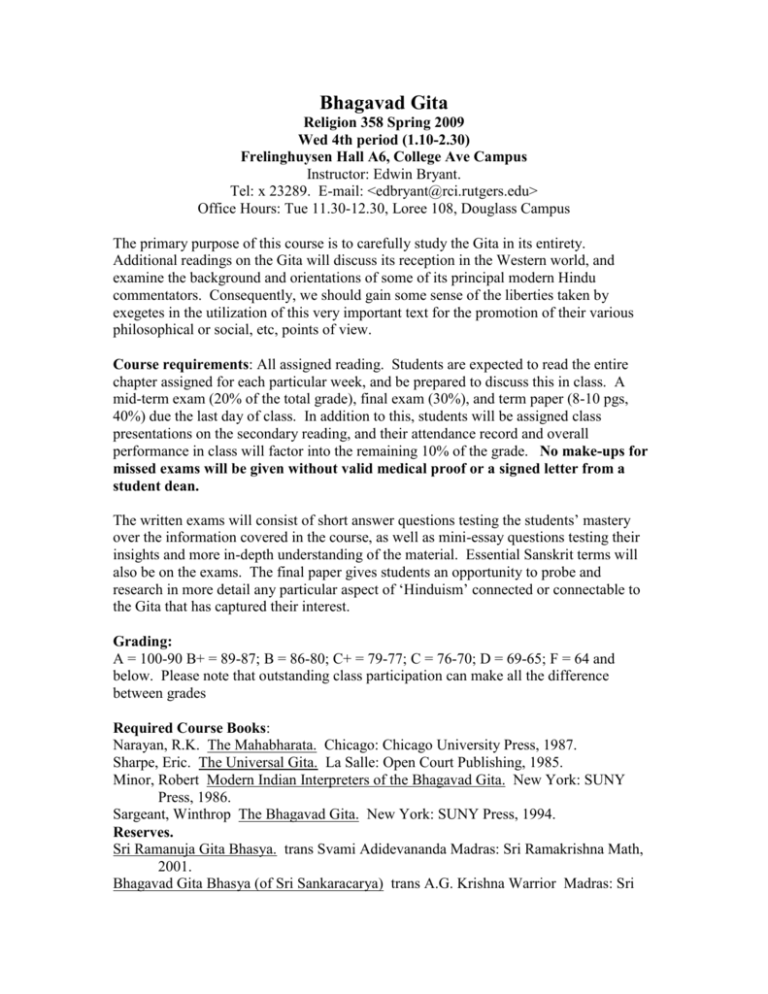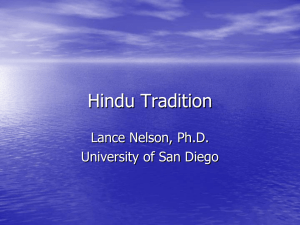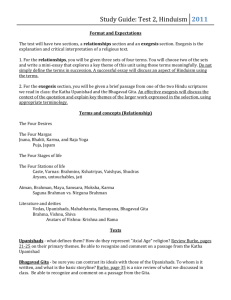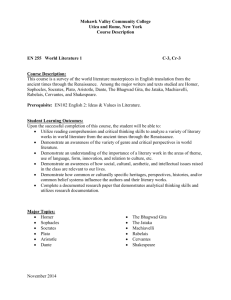Bhagavad Gita
advertisement

Bhagavad Gita Religion 358 Spring 2009 Wed 4th period (1.10-2.30) Frelinghuysen Hall A6, College Ave Campus Instructor: Edwin Bryant. Tel: x 23289. E-mail: <edbryant@rci.rutgers.edu> Office Hours: Tue 11.30-12.30, Loree 108, Douglass Campus The primary purpose of this course is to carefully study the Gita in its entirety. Additional readings on the Gita will discuss its reception in the Western world, and examine the background and orientations of some of its principal modern Hindu commentators. Consequently, we should gain some sense of the liberties taken by exegetes in the utilization of this very important text for the promotion of their various philosophical or social, etc, points of view. Course requirements: All assigned reading. Students are expected to read the entire chapter assigned for each particular week, and be prepared to discuss this in class. A mid-term exam (20% of the total grade), final exam (30%), and term paper (8-10 pgs, 40%) due the last day of class. In addition to this, students will be assigned class presentations on the secondary reading, and their attendance record and overall performance in class will factor into the remaining 10% of the grade. No make-ups for missed exams will be given without valid medical proof or a signed letter from a student dean. The written exams will consist of short answer questions testing the students’ mastery over the information covered in the course, as well as mini-essay questions testing their insights and more in-depth understanding of the material. Essential Sanskrit terms will also be on the exams. The final paper gives students an opportunity to probe and research in more detail any particular aspect of ‘Hinduism’ connected or connectable to the Gita that has captured their interest. Grading: A = 100-90 B+ = 89-87; B = 86-80; C+ = 79-77; C = 76-70; D = 69-65; F = 64 and below. Please note that outstanding class participation can make all the difference between grades Required Course Books: Narayan, R.K. The Mahabharata. Chicago: Chicago University Press, 1987. Sharpe, Eric. The Universal Gita. La Salle: Open Court Publishing, 1985. Minor, Robert Modern Indian Interpreters of the Bhagavad Gita. New York: SUNY Press, 1986. Sargeant, Winthrop The Bhagavad Gita. New York: SUNY Press, 1994. Reserves. Sri Ramanuja Gita Bhasya. trans Svami Adidevananda Madras: Sri Ramakrishna Math, 2001. Bhagavad Gita Bhasya (of Sri Sankaracarya) trans A.G. Krishna Warrior Madras: Sri Ramakrishna Math, 2001 Electronic Reserves: Minor, Bob. Exegetical Commentary on the Bhagavad Gita. Columbia, Missouri: South Asia Books, 1982 [EC]. The Bhagavadgita in the Mahabharata text & translation by J.A.B. van Buitenen, University of Chicago Press, 1981 Selections from the Bhagavata Purana Recommended: Olivelle, Patrick. The Upanisads. Oxford: Oxford University Press, 1996. Miller, Barbara Stoller Yoga. Berkeley: University of California Press, 1996. Tue Jan 20th: Introduction Thur Jan 22nd: Mahabharata Readings: Mahabharata, (approx half). Tue Jan 27th: Mahabharata Readings: Mahabharata, (remainder). Thur Jan 29th: Gita Chapter 1. Readings: Sargeant Van Buitenen, (electronic reserves) 1-68. Sharpe, Introduction and Chap I: “The First Translation.” pp ix - 15. Tue Feb 3rd Gita Chapter 1 (cont), chapter 2.1-10. Readings: Sargeant Sharpe, Chap II: “Romantics and Transcendentalists.” 15-31. Thur Feb 5th: Gita Chapter 2. Readings: Sharpe, Chap III: “Missionaries and Mystics.” pp. 32-46. Tue Feb 10th: Gita Chapter 2 (cont). Readings: Sargeant Sharpe, Chap IV: “Theories of Origins.” pp. 47-63. Thur Feb 12th Chapter 3 Readings: Sargeant Sharpe, Chap V: “RennTaissance, Radicalism and Theosophy.” pp. 67-102 Tue Feb 17th: Gita, Chapter 4. Readings: Sargeant Sharpe, Chap VI: “Gandhi’s Gita.” pp. 103-123. Thur Feb 19th: Gita, Chapter 5. Readings: Sargeant Sharpe, Chap VII: “ Rudolf Otto, J.W. Hauer and T.S. Eliot.” pp. 123-135. Tue Feb 24th: Gita, Chapter 6. Readings: Sargeant Sharpe, Chap VIII: “ The Gita and the Counter-Culture.” pp. 136-147. Thur Feb 26th: Gita, Chapter 7 Readings: Sargeant Sharpe, Chap IX: “Ethical Monotheism and Social Caste.” pp. 148-175. Tues March 3rd: Gita, Chapter 8. Readings: Sargeant Minor, Intro & Chap I: “A Lesson in Allegory: Theosophical Interpretations of the Bhagavadgita.” pp xi-10. Thur March 5th: Gita, Chapter 9. Readings: Sargeant Minor, Chap II: “Bamkim Chandra Chatterji’s New Hinduism and the Bhagavadgita.” pp 34-43. Tues March 10th: Gita, Chapter 10. Readings: Sargeant Minor, Chap III: “Tilak and the Bhagavadgita’s Doctrine of Karmayoga.” pp. 4460. Thur March 12th: Mid-Term Exam. Tue March 17th & Thur March 19th: Spring Break Tue March 24th: Gita, Chapter 11 Readings: Sargeant Minor, Chap IV: Sri Aurobindo as a Gita-yogin.” pp 61-87. Thur March 26th: Gita, Chapter 12 Readings: Sargeant Minor, Chap V: “Gandhi and the Bhagavadgita.” pp 88-109. Tues March 31st: Gita, Chapter 13 Readings: Sargeant Minor, Chap VI: “Vinod Bhave’s Talks on the Gita.” pp. 110-130. Thur April 2nd: Gita, Chapter 14 Readings: Sargeant Minor, Chap VII: “Swami Vivekananda’s Use of the Bhagavadgita.” pp. 131146. Tues April 7th: Gita, Chapter 15 Readings: Sargeant Minor, Chap VIII: “The Bhagavadgita in Radhakrishnan’s Apologetics.” pp. 147-172. Thur April 9th: Gita, Chapter 16 Readings: Sargeant Minor, Chap IX: “Swami Sivananda and the Bhagavadgita.” pp 173-199. Tues April 14th: Gita, Chapter 17 Readings: Sargeant Minor, Chap X: “Swami Bhaktivedanta and the Bhagavadgita ‘As It Is.’” pp. 200-227. Thur April 16th: Gita, Chapter 18 Readings: Sargeant Tues April 21st: Gita, Chapter 18 (cont) Readings: Sargeant Thur April 23rd: Student Paper presentations Tues April 28th: Student Paper Presentations Thur April 30th: Reflections; Review for the final; All Papers Due







